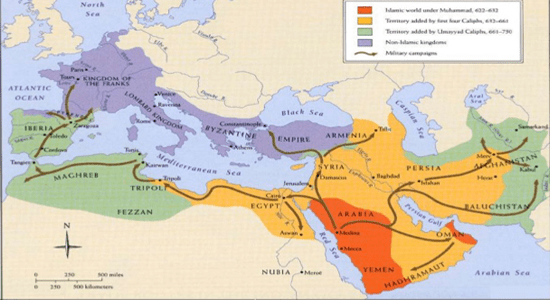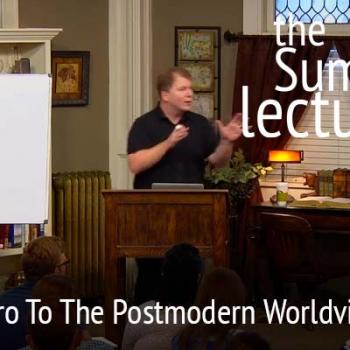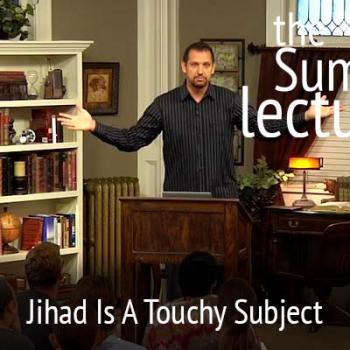 To purchase the entire DVD set of the Summit Lecture Series, visit summit.org. If Islam is divinely inspired, and then, since then it has been corrupted and now we have a “crazy religion”, then the question rests not on the corruptions, but on the original religion. Is it truly divinely inspired? How do we know? That’s what I’m interested in. What did Muhammad originally teach? Did he teach peace? Did he teach violence? Does what he originally taught have anything to do with what Muslims are doing today? To get to the bottom of all this, we need to go to Islam’s origin story. Muhammad was born in 570 AD. He announced his prophethood and established Islam in 610. After he died in 632, there was an early caliphate period until 661. Until the end of this period, Sunni Muslims believe that the first four leaders of Islam were divinely guided. So, pretty much anything that they said or did was legit and in line with God’s commission. After the fourth leader, Ali, there were sultans and other caliphs who Muslims don’t believe were guided by God. Therefore, I am interested in learning what those first Islamic leaders taught and how they interpreted Muhammad. These Later Caliphs and sultans ruled until 1258; and not too far later came the Spanish Inquisition (1492) which radically changed the face of Islam in Europe. Today, it is crystal clear that the Spanish Inquisition was completely unchristian in its intentions and methods. Regardless of its character, the Inquisition brought about tremendous tension between Christians and Muslims that lasted through and beyond the Crusades. Then there was the Ottoman Empire, lasting from 1453-1924, which was the last major Muslim Empire on the planet. It dissolved after World War I. Regarding Islam’s early timeline, by the time Muhammad – an illiterate, uneducated man – died, nearly the entire Arabian Peninsula had converted to Islam. By the time the early caliphs died, the empire had grown by over double its size; and by the end of the first part of early caliphate, Islam had spread from the Atlantic Ocean to India. Many Muslims, even today, believe that this is a sign that God was behind the formation and expansion of Islam.
To purchase the entire DVD set of the Summit Lecture Series, visit summit.org. If Islam is divinely inspired, and then, since then it has been corrupted and now we have a “crazy religion”, then the question rests not on the corruptions, but on the original religion. Is it truly divinely inspired? How do we know? That’s what I’m interested in. What did Muhammad originally teach? Did he teach peace? Did he teach violence? Does what he originally taught have anything to do with what Muslims are doing today? To get to the bottom of all this, we need to go to Islam’s origin story. Muhammad was born in 570 AD. He announced his prophethood and established Islam in 610. After he died in 632, there was an early caliphate period until 661. Until the end of this period, Sunni Muslims believe that the first four leaders of Islam were divinely guided. So, pretty much anything that they said or did was legit and in line with God’s commission. After the fourth leader, Ali, there were sultans and other caliphs who Muslims don’t believe were guided by God. Therefore, I am interested in learning what those first Islamic leaders taught and how they interpreted Muhammad. These Later Caliphs and sultans ruled until 1258; and not too far later came the Spanish Inquisition (1492) which radically changed the face of Islam in Europe. Today, it is crystal clear that the Spanish Inquisition was completely unchristian in its intentions and methods. Regardless of its character, the Inquisition brought about tremendous tension between Christians and Muslims that lasted through and beyond the Crusades. Then there was the Ottoman Empire, lasting from 1453-1924, which was the last major Muslim Empire on the planet. It dissolved after World War I. Regarding Islam’s early timeline, by the time Muhammad – an illiterate, uneducated man – died, nearly the entire Arabian Peninsula had converted to Islam. By the time the early caliphs died, the empire had grown by over double its size; and by the end of the first part of early caliphate, Islam had spread from the Atlantic Ocean to India. Many Muslims, even today, believe that this is a sign that God was behind the formation and expansion of Islam.

More important than Islam’s early history and expansion, though, is Muhammad’s life. As I mentioned, in 610, he claimed prophethood. He did not receive any other revelations or signs from God until three years later. This hiatus of revelation, from 610-613 is known as the Fatrat-e-Wahy. Then, during Muhammad’s early period, from 613-617, he ministered in Mecca, standing up for the abused and oppressed in that region. He relentlessly fought for the rights of orphans, widows, women, and children. During this era, he also tried to align himself with other famous monotheists. With a very peaceful message, he sought out partnership and friendship with Christians and Jews. However, he also often spoke out against the Meccans and their gods during this time. At the time, there were 360 gods around the Kaaba. People would annually come from all over Arabia to Mecca for their pilgrimage. They would bring a bounty each of goods to trade in Mecca, and a thriving industry had evolved. So, when Muhammad said that there was only one God and the polytheistic beliefs that were being celebrated and sold were blasphemy, the Meccan people’s income streams were in jeopardy! This led to a two-year boycott of Muhammad and his teachings in Mecca, from 617-619. It was also during these years that Muhammad’s wife died Ultimately, Muhammad and his followers fled from Mecca and migrated to Medina in 622. Today, the Muslim calendar is centered on this year, also known as the Hijri. So, when you hear Muslim scholars talk about the first century AH (after Hijri), they are referring to the time span of 622 -722 AD. After their flight to Medina, Muhammad and his followers engaged in a lot of battles. While in Medina, Muhammad became the city Arbiter. There were Arab tribes living near Jewish tribes who all consistently battled between one another. In Muhammad, the tribe leaders saw a monotheistic man who was also an Arab, so they assumed he would make the perfect arbitrator between the tribes. In short time, he became the ruler of the entire city, and he immediately began launching raids against the Meccans. These events greatly influenced the changes in Muhammad’s Meccan and Median writings.












